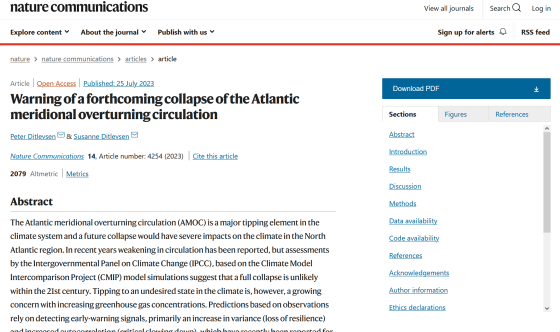Study suggests Atlantic Ocean Circulation could collapse as early as 2025, with major negative impacts on global climate

It has been pointed out that ocean circulation has a great influence on the earth's climate, and at the same time, it is fluctuating under the influence of global warming. In a new paper published by a research team at
Warning of a forthcoming collapse of the Atlantic meridional overturning circulation | Nature Communications
https://doi.org/10.1038/s41467-023-39810-w

Gulf Stream current could collapse in 2025, plunging Earth into climate chaos: 'We were actually bewildered' | Live Science
https://www.livescience.com/planet-earth/climate-change/gulf-stream-current-could-collapse-in-2025-plunging-earth-into-climate-chaos-we-were-actually-bewildered
Gulf Stream could collapse as early as 2025, study suggests | Climate crisis | The Guardian
https://www.theguardian.com/environment/2023/jul/25/gulf-stream-could-collapse-as-early-as-2025-study-suggests
The global-scale oceanic circulation that occurs in the meso-deep layer below several hundred meters is called the thermohaline circulation because it is caused by the salinity and temperature that determine the density of seawater. By circulating oxygen, nutrients, carbon, and heat on a global scale like a belt conveyor by ocean currents, the climate of the earth at the time of article creation is maintained.
AMOC, the most important thermohaline circulation in the Atlantic Ocean, is composed of several ocean currents, including the Gulf Stream . AMOC sends a salty and dense surface current northward, which releases heat off Greenland and cools and subducts to the bottom. The subducting ocean current slowly returns to the south, where it is warmed in the southern sea area, rises to the surface layer, and is sent north again.
Looking at the figure below, created by NASA's Goddard Space Flight Center , you can see that the surface ocean currents shown in red and the lower ocean currents shown in blue circulate on a global scale.

by NASA/Goddard Space Flight Center Scientific Visualization Studio
It is believed that AMOC alternates between two states, the ``faster and stronger mode'', which is the state at the time of article creation, and the ``slower, weaker mode'' where ocean current circulation is poor. The last time the mode switched was
In recent years, it has been pointed out that AMOC is weakening due to fluctuations in the density and salinity of seawater due to freshwater influx caused by glacial collapse in Greenland. In 2021, research results have been announced that the stability of AMOC will be almost completely lost in the past century, and that the mode turning point will come soon.
Research that one of the ocean circulation systems, the stability of the Atlantic north-south thermohaline circulation has been almost completely lost - GIGAZINE

However, since direct AMOC observation data are only available after 2004, it has been difficult to analyze AMOC variability on a long-term scale. Therefore, a research team led by Suzanne Ditletsen , a professor of statistics at the University of Copenhagen, entered data on the surface seawater temperature of the North Atlantic Ocean, which has been measured since 1870, into a statistical model and predicted variations in AMOC.
As a result, it turns out that the AMOC mode may change much sooner than originally expected, between 2025 and 2095. Co-author of the paper , Peter Dittleussen of the University of Copenhagen, told the scientific media Live Science, ``The collapse of AMOC could be very near, and the consequences would be very serious, so we are now We must act immediately,' he said.
Overseas media The Guardian said, ``If AMOC collapses, it will adversely affect the rain needed to procure food for billions of people living in India, South America, and West Africa, and will bring disastrous results around the world.Europe 'Increase in storms and cooler temperatures will lead to sea level rise on the east coast of North America, and the Amazon rainforest and Antarctic ice sheets could also be at risk.'
On the other hand, regarding this research, there is uncertainty in the use of seawater temperature to predict ocean current velocity, and it has been pointed out that there are many assumptions and unknown variables before reaching the conclusion. . ``The mathematical side seems to be professionally handled, but the physical foundation is extremely unstable,'' said Jochem Marotzke , director of the Max Planck Meteorological Institute. David Thornalley , Associate Professor of Geography at University College London, also said that there are many unknowns in the study and further research is needed.

Related Posts:
in Science, Posted by log1h_ik






